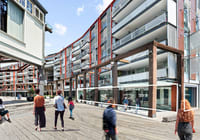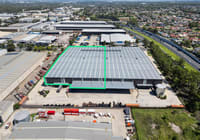
Mall owner Vicinity locks in retail rebound
Shopping centre owner Vicinity Centres has made hay while the sun shines, striking leases at higher rents with its tenants as the retail sector proved more robust than expected during the first half of financial year 2024.
Vicinity’s stronger than expected result for the 2024 first half allowed it to upgrade its existing guidance for its full-year 2024 earnings to the “top end” of the range it has given for funds from operations of 14.1¢ to 14.5¢.

“There is no doubt that trading conditions in the first half have been more resilient than expected,” chief executive Peter Huddle told analysts on Thursday.
“And in this context, we have once again acted at pace to lock in long-term leasing deals in anticipation of more challenging trading conditions ahead.”
The spread on those leases – the difference in rents between expiring and new rental agreements – came in at 3.3 per cent, compared to the average of 0.3 per cent across the 2023 full year. Leasing spreads are a closely watched metric in the retail real estate sector.
Nevertheless, sales growth figures for Vicinity’s tenants show some of the bounce was coming out of the retail sector by the time Christmas arrived. Sales growth eased to 0.4 per cent by the December quarter, down from 1.4 per cent in the previous quarter and 3.6 per cent in the June quarter.
Mr Huddle said Vicinity had allowed for that more recent slowdown in retail conditions in its guidance for the full-year, even factoring in the prospect of leasing spreads turning negative.
“Typically, there is a delay between the sales performance and the leasing spread,” he told The Australian Financial Review. “Sales have moderated towards the back half of this year and there’s a delay between the confidence of our customers, the retailers, to then sign up to new leases.”
Further ahead though Mr Huddle, who took over the top job at Vicinity last year, is confident economic conditions will swing in favour of the sector, including a tight jobs market, strong tourism and migration numbers, the prospect of interest rates peaking and potentially falling and stage three tax cuts.
“We anticipate in the not too distant future there may be some further confidence coming into retail sales,” he said. “We’re cautious on the next couple of quarters, but we do anticipate improved trading conditions towards the back half of this calendar year.”
Vicinity booked in a statutory interim profit of $223.5 million, up from $176.3 million a year earlier. Funds from operations, the industry’s preferred measure, fell 3.2 per cent to $345.6 million, equivalent to 7.6¢ per security. Adjusting for one-off items, it rose 2.9 per cent.
The landlord’s 59-asset portfolio includes the country’s largest mall and a luxury destination, Chadstone in Melbourne’s south-east, which it owns jointly with Rich Lister John Gandel. It also includes DFO and outlet facilities, along with prized CBD interests such as Emporium Melbourne and the Queen Victoria Building in Sydney.
In another sign of confidence, Vicinity bought back the remaining half of Chatswood Chase in Sydney, giving it full control of a mall where it has ambitious expansion plans for luxury retail. It is also divesting interests in several smaller malls and properties.
“We have been more aggressive more recently in terms of looking at our total portfolio to fund our growth initiatives,” Mr Huddle told the Financial Review.
“Fundamentally it’s about looking at assets that have liquidity in the marketplace that we can divest at good pricing – well above book value – to then recycle that money into growth opportunities.”











